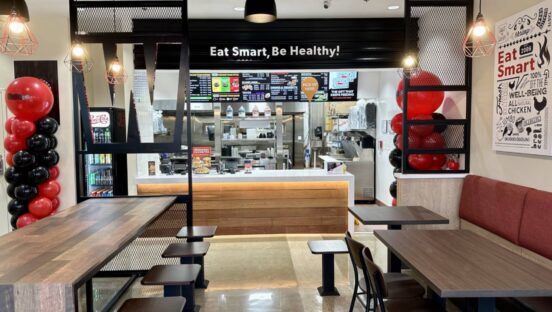Social entrepreneurship—the model in which private businesses strive to affect social and cultural change—has become a popular notion for many upstart businesses in the last decade, especially for those businesses founded by Millennial entrepreneurs. From TOMS Shoes to Warby Parker, consumer brands have capitalized on Americans’ growing desire to commit their dollars to socially conscious businesses.
Now two Seattle Millennials—friends since kindergarten—are using organic produce, hands-on farming practices, and the humble sandwich to bring social entrepreneurship to the fast-casual industry.
Ben Friedman and Brad Gillis opened Homegrown Sustainable Sandwich Shop in 2009 and have since built it to 10 units in the Seattle metro area. The better-sandwich concept sources all organic produce, eggs, and milk, as well as all-natural meats and cheeses. Everything in the restaurant is recyclable and compostable—there are no trashcans—and the company even founded its own farm outside Seattle to further invest in its passion for sustainability.
All of it combines to form a movement that the company refers to as “sandwich environmentalism.”
“We wanted to spend our lives working on the environment and pushing it forward with the ideals of conservation and sustainability,” Friedman says. “The idea that we could fuse the two things together, that we could fuse being in business and doing good for the world, was a really exciting thing to us.”
On top of its high-quality sourcing practices, Homegrown uses energy-efficient lighting, low-VOC paint, and reclaimed and recycled materials in its restaurants. But it’s the food that the business partners believe can have the biggest social impact as the company scales; not enough Americans have access to these kinds of high-quality ingredients, the two say.
“At the time we launched Homegrown, this type of food was only offered in two settings: one of them was grocery, and one of them was fine dining,” Gillis says. “We thought that there were not a lot of people who had access to great or local products every day at an affordable price.”
Sandwiches, Friedman and Gillis figured, were the perfect vehicle to deliver sustainable ingredients to the masses.
Homegrown’s menu includes standards like the BLT; the Turkey, Bacon & Avocado; and the Smoked Pastrami, as well as more innovative options like the TLT (tofu, lettuce, and tomatoes) and the Chicken Cherry Pecan. The menu also includes salads, breakfast items, soups, and kids’ options.
“We saw an opportunity to create a product around changing the food system, and if we curated everything about a sandwich, then a sandwich could be a really powerful mechanism for change,” he says. “We recognize that if we curate everything, if we make all these choices around sustainability and craft our brand around the tenets of sustainability, then as we grow … we can really affect change on a broad scale.”
A big part of Homegrown’s mission is Sprouting Farms, a half-acre plot about a half hour outside of Seattle that the company established in 2014. The Homegrown team harvests baby spinach, baby mixed greens, baby kale, cucumber, and heirloom tomatoes from the USDA-certified organic farm, but Friedman says starting a farm was about more than having a reliable source for its ingredients. It was about giving employees across the system a place to congregate and learn how to drive the movement forward.
“It’s sort of one place where we can all come out and be together and where we can teach our staff about the values of our mission first-hand,” he says.
Not all of Homegrown’s produce can come from Sprouting Farms; the Pacific Northwest’s short growing season necessitates the company look elsewhere for much of its organic produce. But Gillis says about two tons of produce was sourced from the farm last year, adding that at peak season, the concept sources 100 percent of its tomatoes and 20 percent of its greens from Sprouting Farms.
“It's really about supplementing our food throughout the year and adding home-grown, organic produce,” Friedman says. “It just felt like the ultimate expression of our mission.”
The Homegrown mission is now stretching beyond its Seattle home base. In September, the company will open its first location in San Francisco, a spot in the city’s Financial District that the founders commemorated with a road trip between the two cities. The new location will further develop Homegrown’s conscious sourcing practices by incorporating Northern California food purveyors.
From there, Friedman and Gillis believe the concept can go almost anywhere in the U.S.—especially to those cities where residents have embraced a more socially and environmentally conscious approach to food.
Friedman says Americans are recognizing that “our agricultural system is broken.” Consumer brands like Homegrown, he adds, have the responsibility to facilitate the change customers are looking for in the food industry.
“Consumer brands have more power than political movements; we’re seeing brands like Whole Foods and Chipotle push issues like GMOs forward far faster than any other vehicle that we have in society,” he says. “For us, we're selling 100 percent organic produce. We're doing more than Chipotle is with food, and when you think like that, when we get to scale, the impact it will have can be tremendous.”






